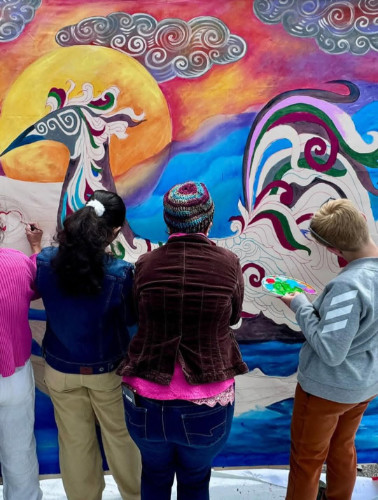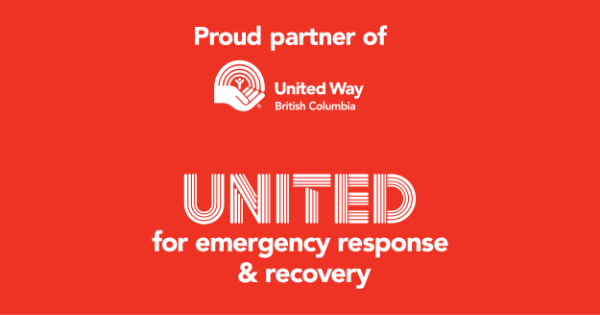September 1, 2025 — There are no longer bouquets of flowers, rows of candles, and handwritten notes at the fence of the John Oliver Secondary School along East 41st Avenue and Fraser Street– the makeshift memorial in the aftermath of the tragedy that struck the Lapu-Lapu festival in Vancouver on April 26, 2025.
Fraser Street, which was blocked and cordoned off by police, has long since reopened, and the constant hum of rushing vehicles has replaced the muffled cries and whispered prayers of the thousands who flocked at the site to grieve, pay respect to the victims, and support members of the community.
But not everything has returned to normal, especially for those whose lives have been overturned by the tragedy.
 Participants of an art workshop for healing organized by the Philippine Artists Network for Community Integrative Transformation (Pancit) paint a mural at the Pinoy Festival 2025 on June 14 in Burnaby. Photo courtesy of Migrante BC.
Participants of an art workshop for healing organized by the Philippine Artists Network for Community Integrative Transformation (Pancit) paint a mural at the Pinoy Festival 2025 on June 14 in Burnaby. Photo courtesy of Migrante BC.
“People are still healing,” said Diane Zapata, vice chairperson of the grassroots Filipino migrants-rights group Migrante BC.
Migrante was among the community organizations that led the response to the tragedy, organizing gatherings, and calling for justice for the victims and all others affected.
“The trauma still lingers and it will take much more than a few months not to think of and see the horrific images,” said Zapata, who was at the street party named after a Filipino Indigenous chieftain, who fought against Spanish colonizers in the 16th century.
Eleven people died and many were injured after a vehicle sped through a crowd, ramming people lining up before food trucks or walking slowly on their way home as the festival events were winding down.
Police have filed 11 charges of second-degree murder against Kai-Ji Adam Lo, the driver of the vehicle.
Lo, 30, appeared at the provincial court in a two-day hearing in July to determine if he is mentally fit to stand trial for the attack. Police had said that Lo had a significant history of mental health interactions with law enforcers.
Zapata recently visited the site of the tragedy along East 43rd and Fraser, the first time since the incident.
“I have been avoiding it. When I got there, there were flashbacks of people screaming, searching for loved ones and friends, people helping, and the horror upon seeing the victims,” she said.
Like others who were there, Zapata said she could not sleep for weeks after the tragedy, which took a toll on her health.
“I have come to recognize that I have lingering trauma from what happened,” she said.
The incident that deeply struck Vancouver residents spurred a groundswell of support for the victims and those affected.
Aside from donations to the victims and their families, offers of free counselling, spaces for healing and reflection, and other forms of support to help in the coping and recovery from the tragedy continue to pour in. Community debrief and therapy sessions have been made possible because of these free services and spaces.
At the Tahanan Studio, a creative space at 310 East 5th Avenue in Vancouver, anyone can walk in to read or borrow books on coping with loss and healing trauma, and care practices. There is no due date for the books, and the studio also offers space for grieving and healing.
Housed at the Tahanan Studio, a resource called “Place to Be: A Grief Library” was put up after a book donation drive to support those grieving or coping to terms with the loss of lives and suffering in what was supposed to be a celebration of Filipino culture and diaspora.
Lele Chan, founder of Tahanan Studio, said nearly a hundred visitors have dropped by to browse or borrow books since it started to operate in June.
Chan said the visitors welcomed the availability of a variety of books on dealing with grief and trauma. “The have been looking for books to help process their own grief and how to communicate with children (on dealing with grief),” Chan said.
Zapata is part of a cohort of an art workshop for healing organized by the Vancouver-based Philippine Artists Network for Community Integrative Transformation (Pancit).
“Migrante was busy organizing help for the victims and those affected and it was much later that I realized that I was among those who also needed help,” she said.
A Pancit workshop had 12 participants and involved lessons on basic techniques in art, including drawing, colours and shading. But the focus was on art for trauma healing.
“While knowing the basic techniques is essential, the workshop intended to take our minds off from the trauma and putting this in the artwork and to see ourselves in the art,” said Zapata.
The cohort has produced group and individual murals that were shown during the observance of the 40th day after the tragedy and the Pinoy Festival held on June 14, 2025 in the city of Burnaby.
For Zapata, the healing and moving on from the tragedy will not be complete if the questions on what and why it happened will be unanswered.
“We should not stop at fundraising or the grieving and healing activities even as these are important. We should continue the discussions on what accountability and justice mean for the community,” she said.
The Rise Up for Accountability and Justice (RUJA), a national alliance of organizations formed in response to the tragedy, is calling on the government to address the concerns highlighted by the tragedy.
“We know number of fatalities, but public does not even how many were injured and indirectly affected or impacted by the tragedy,” said Zapata.
In a statement last July, Filipino BC, the organizer of the Lapu-Lapu festival, said it recognizes that community members are seeking answers and justice.
Zapata said community members whom their organization has been dealing with see the tragic loss of lives and scarring of the lives of many others as one needing changes in public safety and mental health.
“We have systematic problems especially on mental health concerns and we continue to ask why it had to reach this point,” said Zapata.










